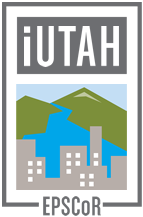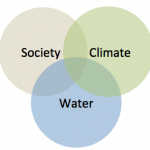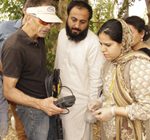The GCSC provides tangible support to interdisciplinary efforts across campus which promote research and training to move sustainability forward in our communities.

The Hestia Project
The Hestia Project™ will revolutionize how the world approaches and interacts with the climate change problem. The Hestia system quantifies all fossil fuel CO2 emissions at the scale of buildings, streets and factories. Hestia can provide stakeholders an unprecedented opportunity to design and implement carbon management strategies, verify emissions reductions, strengthen and support basic research in climate prediction and carbon cycle science, and allow the public, decision makers, scientists and industry access to detailed space-time information on fossil/industrial energy consumption and CO2 emissions. All this will be done via an intuitive, interactive, photorealistic, three-dimensional visualization of the Earth.

iUtah
iUTAH is an interdisciplinary research and training program aimed at strengthening science for Utah’s water future. iUTAH brings together a network of researchers, universities, governmental agencies, industry partners, and non-profit organizations state-wide. This five-year project is funded by the National Science Foundation through July 2017.

Land-Atmosphere Interactions Research Group (LAIR)
The University of Utah's Land-Atmosphere Interactions Research (LAIR) group is interested in studying a variety of research topics related to environmental science that lie at the interface between the atmosphere and land surface.
Program for Air Quality, Health, and Society
The Program for Air Quality, Health, and Society brings together investigators from across the University of Utah and beyond to establish multidisciplinary collaborations devoted to studies concerning air quality. They are a recognized, credible resource for information concerning air quality for use by universities, business and industry, education, and public policy decision makers. They exploit the distinctive and varied environment in the state to generate new knowledge concerning the impact of air quality on human health and society. They also explore all facets of air pollution, from its generation to health-effects mechanisms in individuals to societal implications and ways to reduce or mitigate these effects.
Society, Water, and Climate (SWC)
The University of Utah has created a new, interdisciplinary faculty cluster focusing on areas of Society, Water, and Climate (SWC). This transformative cluster connects research on hydrology, air quality, climate change, societal response, and policy, seeking to meld multiple scientific perspectives to lead society towards sustainable water solutions in a changing world.
Taft-Nicholson Center
As an official extension of the University of Utah campus, the Taft-Nicholson Center works to bridge the arts and humanities with the sciences. It's mission is to increase environmental literacy, boost environmental awareness and inspire personal connection to nature and the Greater Yellowstone Ecosystem.
U.S. - Pakistan Centers for Advanced Studies in Water
U.S.-Pakistan Center for Advanced Studies in Water at the University of Utah (USPCASW, UU) is a world class education and applied research center dedicated to resolving Pakistan’s water crises through applied research, developing specialist human resource and technologies; academia-industry collaboration; and policy formulation.



